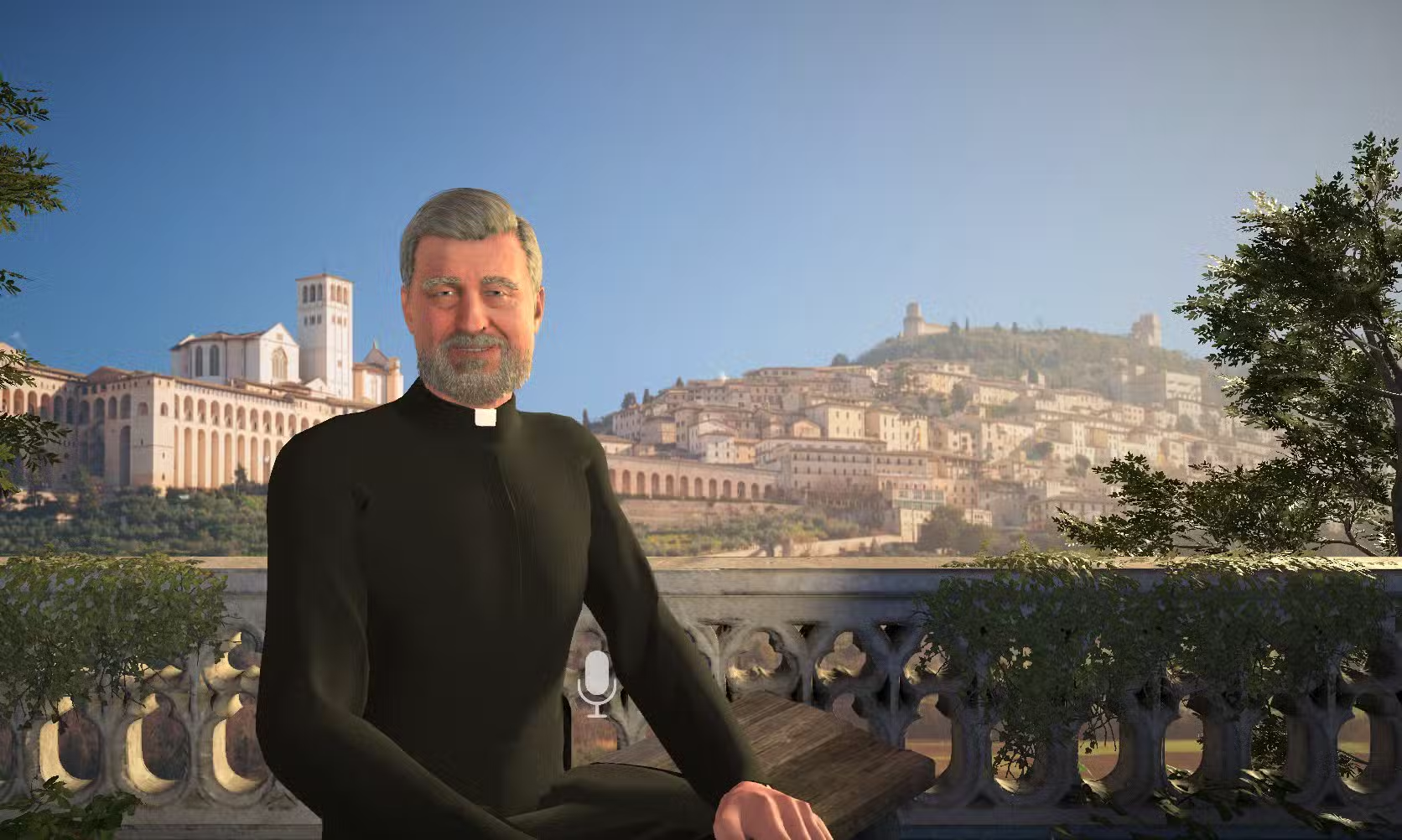VATICAN CITY (CNS) — For the nearly 10 years that Pope Francis and retired Pope Benedict XVI lived on opposite sides of St. Peter’s Basilica, the two popes’ relationship was marked by a deep mutual respect and profound sense of solidarity, Pope Francis said.
The retired pope, he said, would even defend Pope Francis before his critics.
In a book-length interview, “El Sucesor” (“The Successor”), scheduled for publication in Spain April 3, Pope Francis recalled the support he received from his predecessor in specific incidents and throughout his pontificate.
Speaking with Spanish journalist Javier Martínez-Brocal, the pope pointed to the time he spoke favorably about French civil union laws during an airborne press conference returning to Rome from Slovakia. laws. A group of cardinals went to the Vatican monastery where Pope Benedict lived and, he said, “practically put me on trial, and in front of him they accused me of promoting homosexual marriage.”
“Benedict was not shaken, because he knew perfectly well what I think,” Pope Francis said. “He listened to them, one by one, calmed them down and explained everything.”
Pope Francis said the situation made him realize that people around him were silently waiting for opportunities to attack him, but Pope Benedict “always defended me.”
In three separate interview sessions with Martínez-Brocal for the book, Pope Francis repeated several times that Pope Benedict never said he disagreed with him, but that the retired pope would sometimes encourage him to seek out more information or consider other points of view.
“He never took his support away from me. Maybe there was something I did that he did not agree with, but he never said so,” Pope Francis recalled.
The pope traced Pope Benedict’s support for him back to when he was archbishop of Buenos Aires. He said that as he was approaching 75 — the age at which all Catholic bishops must offer their resignation to the pope — a group of Vatican officials in the Dicastery for Bishops “had assembled a story so that the pope would accept my resignation as archbishop of Buenos Aires” and already had a replacement for him lined up.
“I don’t know why Cardinal Bergoglio has so many enemies here,” Pope Francis recalled his predecessor saying in a conversation with Cardinal Marc Ouellet, then-prefect of the dicastery, before deciding to postpone his resignation for two years. Cardinal Bergoglio was elected pope less than 15 months after his 75th birthday.
“I experienced that decision as a demonstration of confidence in me that I was very grateful for,” he said.
However, Pope Francis did not shy away from discussing tensions with Pope Benedict’s aides. Praising Pope Benedict’s meekness — which he insisted was not a weakness — Pope Francis said some people close to Pope Benedict took advantage of his kind nature, “limited his actions” and gradually “fenced him off.”
He said he asked Pope Benedict’s secretary, Archbishop Georg Gänswein, to take a voluntary leave following controversy surrounding the 2020 publication of a book supposedly co-authored by the retired pope and Cardinal Robert Sarah, then-prefect of the Congregation for Divine Worship and the Discipline of the Sacraments.
The book, “From the Depths of Our Hearts: Priesthood, Celibacy and the Crisis of the Catholic Church,” argued against changing the discipline of celibacy for Latin-rite Catholic priests and was published as Pope Francis prepared his apostolic exhortation on the Synod of Bishops on the Amazon. Bishops at the synod had discussed the possibility of ordaining some married men, a suggestion Pope Francis did not accept. But the book — displaying side-by-side portraits of Pope Benedict and Cardinal Sarah on its cover– was widely interpreted as a rare public interjection from the retired pope to exert pressure on Pope Francis.
Archbishop Gänswein later said Pope Benedict willingly contributed to the book but did not approve being credited as a co-author, chalking up the incident to a “misunderstanding.”
“Maybe I made a mistake in naming (Cardinal Sarah) prefect of the now-Dicastery for Divine Worship,” Pope Francis said reflecting on the incident. “From there he was manipulated by separatist groups, but he is a good man,” he said, hypothesizing that working in the Curia made him “bitter.”
The pope also said he was “pained” by the publication of Archbishop Gänswein’s book about his experiences with Pope Benedict on the day of the late pope’s funeral. The timing of the publication showed a “lack of nobility and humanity.”
Pope Francis called the supposed tensions between his supporters and supporters of Pope Benedict “nonsense,” adding that some people in the church use Pope Benedict to attack him only when they don’t have real arguments to make against him, and that such people even “attribute things to Benedict that are not true.”
“If there was a man than went forward, that was progressive, it was him,” the pope said referring to his predecessor, noting how then-Father Joseph Ratzinger was “viewed with skepticism” during the Second Vatican Council for his advanced views. “Also, the decision to resign was very forward-thinking, very progressive.”
While he noted that all popes are in some way misunderstood, Pope Francis said that “in the case of Benedict, (people) did not understand that interior freedom that he had.”
“His resignation was an act of integrity. He was a man that was not at all attached to power,” Pope Francis said.
After being elected to succeed Pope Benedict in 2013, he said he never felt pressure from the retired pope, although they sometimes discussed issues together. The German Synodal Path was of concern to Pope Benedict, he said, and they discussed the letter Pope Francis sent to German Catholics in 2019. However, he said, they did not discuss Pope Francis’ 2021 apostolic letter “Traditionis Custodes” (Guardians of the Tradition) restricting the celebration of the pre-Vatican II Mass which Pope Benedict had expanded.
Pope Benedict died Dec. 31, 2022. Pope Francis said that while he was not involved in planning Pope Benedict’s funeral, he said he has already made changes to simplify the papal funeral rites to bury popes “like any son of the church.” Among the changes, he said, popes will have a single wake during which the body will already be in a casket rather than lying on a catafalque for public viewing.
While Pope Francis said Pope Benedict fits the bill for being proclaimed a doctor of the church — a saint whose writings have had a particularly notable influence on Catholic theology or spirituality — he said the naming of new doctors of the church is on hold since so many religious congregations request that their founders receive the title.
By Justin McLellan | Catholic News Service







News & Commentary
Pope Francis on his relationship with Benedict: ‘He always defended me’
VATICAN CITY (CNS) — For the nearly 10 years that Pope Francis and retired Pope Benedict XVI lived on opposite sides of St. Peter’s Basilica, the two popes’ relationship was marked by a deep mutual respect and profound sense of solidarity, Pope Francis said.
The retired pope, he said, would even defend Pope Francis before his critics.
In a book-length interview, “El Sucesor” (“The Successor”), scheduled for publication in Spain April 3, Pope Francis recalled the support he received from his predecessor in specific incidents and throughout his pontificate.
Speaking with Spanish journalist Javier Martínez-Brocal, the pope pointed to the time he spoke favorably about French civil union laws during an airborne press conference returning to Rome from Slovakia. laws. A group of cardinals went to the Vatican monastery where Pope Benedict lived and, he said, “practically put me on trial, and in front of him they accused me of promoting homosexual marriage.”
“Benedict was not shaken, because he knew perfectly well what I think,” Pope Francis said. “He listened to them, one by one, calmed them down and explained everything.”
Pope Francis said the situation made him realize that people around him were silently waiting for opportunities to attack him, but Pope Benedict “always defended me.”
In three separate interview sessions with Martínez-Brocal for the book, Pope Francis repeated several times that Pope Benedict never said he disagreed with him, but that the retired pope would sometimes encourage him to seek out more information or consider other points of view.
“He never took his support away from me. Maybe there was something I did that he did not agree with, but he never said so,” Pope Francis recalled.
The pope traced Pope Benedict’s support for him back to when he was archbishop of Buenos Aires. He said that as he was approaching 75 — the age at which all Catholic bishops must offer their resignation to the pope — a group of Vatican officials in the Dicastery for Bishops “had assembled a story so that the pope would accept my resignation as archbishop of Buenos Aires” and already had a replacement for him lined up.
“I don’t know why Cardinal Bergoglio has so many enemies here,” Pope Francis recalled his predecessor saying in a conversation with Cardinal Marc Ouellet, then-prefect of the dicastery, before deciding to postpone his resignation for two years. Cardinal Bergoglio was elected pope less than 15 months after his 75th birthday.
“I experienced that decision as a demonstration of confidence in me that I was very grateful for,” he said.
However, Pope Francis did not shy away from discussing tensions with Pope Benedict’s aides. Praising Pope Benedict’s meekness — which he insisted was not a weakness — Pope Francis said some people close to Pope Benedict took advantage of his kind nature, “limited his actions” and gradually “fenced him off.”
He said he asked Pope Benedict’s secretary, Archbishop Georg Gänswein, to take a voluntary leave following controversy surrounding the 2020 publication of a book supposedly co-authored by the retired pope and Cardinal Robert Sarah, then-prefect of the Congregation for Divine Worship and the Discipline of the Sacraments.
The book, “From the Depths of Our Hearts: Priesthood, Celibacy and the Crisis of the Catholic Church,” argued against changing the discipline of celibacy for Latin-rite Catholic priests and was published as Pope Francis prepared his apostolic exhortation on the Synod of Bishops on the Amazon. Bishops at the synod had discussed the possibility of ordaining some married men, a suggestion Pope Francis did not accept. But the book — displaying side-by-side portraits of Pope Benedict and Cardinal Sarah on its cover– was widely interpreted as a rare public interjection from the retired pope to exert pressure on Pope Francis.
Archbishop Gänswein later said Pope Benedict willingly contributed to the book but did not approve being credited as a co-author, chalking up the incident to a “misunderstanding.”
“Maybe I made a mistake in naming (Cardinal Sarah) prefect of the now-Dicastery for Divine Worship,” Pope Francis said reflecting on the incident. “From there he was manipulated by separatist groups, but he is a good man,” he said, hypothesizing that working in the Curia made him “bitter.”
The pope also said he was “pained” by the publication of Archbishop Gänswein’s book about his experiences with Pope Benedict on the day of the late pope’s funeral. The timing of the publication showed a “lack of nobility and humanity.”
Pope Francis called the supposed tensions between his supporters and supporters of Pope Benedict “nonsense,” adding that some people in the church use Pope Benedict to attack him only when they don’t have real arguments to make against him, and that such people even “attribute things to Benedict that are not true.”
“If there was a man than went forward, that was progressive, it was him,” the pope said referring to his predecessor, noting how then-Father Joseph Ratzinger was “viewed with skepticism” during the Second Vatican Council for his advanced views. “Also, the decision to resign was very forward-thinking, very progressive.”
While he noted that all popes are in some way misunderstood, Pope Francis said that “in the case of Benedict, (people) did not understand that interior freedom that he had.”
“His resignation was an act of integrity. He was a man that was not at all attached to power,” Pope Francis said.
After being elected to succeed Pope Benedict in 2013, he said he never felt pressure from the retired pope, although they sometimes discussed issues together. The German Synodal Path was of concern to Pope Benedict, he said, and they discussed the letter Pope Francis sent to German Catholics in 2019. However, he said, they did not discuss Pope Francis’ 2021 apostolic letter “Traditionis Custodes” (Guardians of the Tradition) restricting the celebration of the pre-Vatican II Mass which Pope Benedict had expanded.
Pope Benedict died Dec. 31, 2022. Pope Francis said that while he was not involved in planning Pope Benedict’s funeral, he said he has already made changes to simplify the papal funeral rites to bury popes “like any son of the church.” Among the changes, he said, popes will have a single wake during which the body will already be in a casket rather than lying on a catafalque for public viewing.
While Pope Francis said Pope Benedict fits the bill for being proclaimed a doctor of the church — a saint whose writings have had a particularly notable influence on Catholic theology or spirituality — he said the naming of new doctors of the church is on hold since so many religious congregations request that their founders receive the title.
By Justin McLellan | Catholic News Service